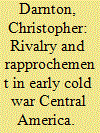| Srl | Item |
| 1 |
ID:
186703


|
|
|
|
|
| Summary/Abstract |
How should political scientists navigate the ethical and methodological quandaries associated with analyzing leaked classified documents and other nonconsensually acquired sources? Massive unauthorized disclosures may excite qualitative scholars with policy revelations and quantitative researchers with big-data suitability, but they are fraught with dilemmas that the discipline has yet to resolve. This paper critiques underspecified research designs and opaque references in the proliferation of scholarship with leaked materials, as well as incomplete and inconsistent guidance from leading journals. It identifies provenance as the primary concept for improved standards and reviews other disciplines’ approaches to this problem. It elaborates eight normative and evidentiary criteria for scholars by which to assess source legitimacy and four recommendations for balancing their trade-offs. Fundamentally, it contends that scholars need deeper reflection on source provenance and its consequences, more humility about whether to access new materials and what inferences to draw, and more transparency in citation and research strategies.
|
|
|
|
|
|
|
|
|
|
|
|
|
|
|
|
| 2 |
ID:
171777


|
|
|
|
|
| Summary/Abstract |
Can public diplomacy help resolve protracted international conflicts? Both rationalist and constructivist traditions identify significant domestic obstacles to international peacemaking. However, Robert Putnam's concept of “reverberation” implies that diplomats can expand their adversaries’ win-sets for cooperation by engaging foreign publics. This paper analyzes a most-likely case, with archival evidence: Argentine Ambassador Oscar Camilión's unsuccessful quest for Argentine-Brazilian rapprochement in 1976–77. Although the two countries later overcame rivalry, public diplomacy contributed negligibly to this success: internal Argentine divisions created mixed messages toward Brazil, Brazilian leaders launched a competing public relations operation, and these two currents obstructed and nearly terminated Camilión's mission. This case illuminates the paradoxes of Argentine foreign policymaking under military rule and offers a cautionary tale for scholars and practitioners of public diplomacy and conflict resolution.
|
|
|
|
|
|
|
|
|
|
|
|
|
|
|
|
| 3 |
ID:
105851


|
|
|
|
|
| Publication |
2011.
|
| Summary/Abstract |
Under what conditions does a common threat cause rival states to achieve rapprochement? To inform not only contemporary policy debates about coalition-building against terrorism and insurgency, but also theoretical debates about obstacles to cooperation and conflict resolution, this article examines the pattern of rivalry and rapprochement among Central American states-non-Communist allies under the Rio Treaty-in the shadow of the Cuban Revolution of 1959. Given a common threat, why did Honduras and Nicaragua shift from rivalry to rapprochement while Costa Rica and Nicaragua, and El Salvador and Honduras, did not? Drawing on rarely explored published primary sources in English and Spanish, the article argues that the major obstacle to cooperation was the parochial interest of the armed forces in perpetuating the old mission of international rivalry despite the attractive new mission of internal security, and that presidents were able to achieve rapprochement only where state resource constraints compelled a trade-off between the old and new missions. This argument is tested against realist alternatives including balancing and bandwagoning, and liberal alternatives including democratic peace and counterrevolutionary ideology. The article demonstrates that spoilers within the state can perpetuate international conflict, but also indicates conditions under which they can be convinced to support international cooperation.
|
|
|
|
|
|
|
|
|
|
|
|
|
|
|
|
| 4 |
ID:
134523


|
|
|
|
|
| Summary/Abstract |
This paper analyzes the development of cooperation between Argentina and Brazil from their initial rapprochement of 1979 to the construction of Mercosur in 1991. It presents an account of cooperation that emphasizes the power and organizational interests of the armed forces and that challenges the prevailing emphases on democratization and neoliberalism. In doing so, it addresses a methodological problem for qualitative research in international relations: What can be done if our theories of why cooperation occurs affect our perceptions of when it begins? Conventional explanations of Argentine–Brazilian cooperation may be biased toward what historian Herbert Butterfield called “Whig history,” which sees in past events associations that exist only in the present. These tendencies can alter our periodization of cases, omit or falsely reject important causal variables, and too readily confirm our preferred hypotheses, but they can also be corrected.
|
|
|
|
|
|
|
|
|
|
|
|
|
|
|
|